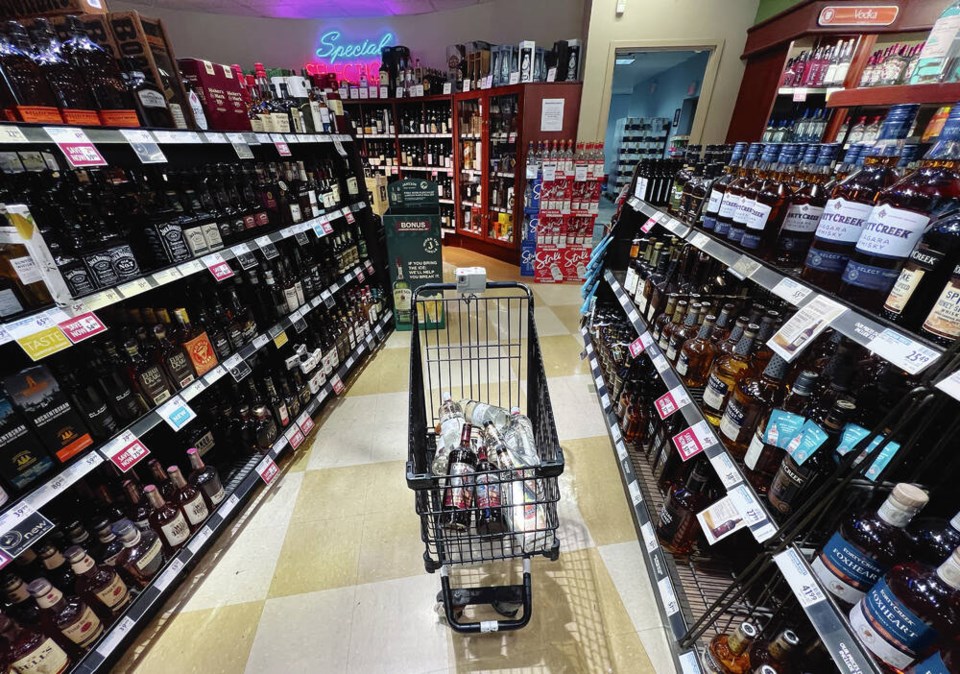After the first weekend of job action and liquor rationing that left some customers disgruntled, there was no sign negotiations would resume between the B.C. Government Employees Union and the province.
Early Monday, the union declared a non-emergency ban on overtime for members. The overtime ban excludes members of the B.C. Wildfire Service, according to a BCGEU news release.
“B.C.’s public service has been reliant on our members’ overtime for far too long and dealing with the systemic issues behind that reliance is part of what we’re trying to achieve in this round of bargaining,” said Stephanie Smith, BCGEU president and chair of the union’s public service bargaining committee, in a statement Monday.
“In this job action our members are the vanguard of the broader public sector in our province. We hope this escalation gives government the incentive they need to invite us back to the bargaining table and negotiate a deal that will ensure robust, sustainable public services for our province.”
A day earlier, B.C. Finance Ministry officials said it was “status quo” on the negotiating front — and no change to rationing limits at government liquor stores.
The BCGEU negotiating team rejected the Public Service Agency’s most recent 10.99 per cent wage hike over three years. The last formal negotiating meeting was on July 4.
Union representatives did not immediately respond to questions on Sunday.
The BCGEU’s “targeted job action” saw 950 workers walk off the jobs early last week at B.C. Liquor Distribution Branch wholesale and distribution centres in Victoria, Delta, Richmond and Kamloops.
It means no liquor or cannabis will be distributed to B.C. businesses, and while businesses such as restaurants and pubs can restock from retail stores, that will only last as long as retail stores start running out.
Ian Tostenson, president of the B.C. Restaurant and Foodservices Association, said Sunday he already fielded concerns from restaurateurs during the weekend.
Tostenson said the effects on restaurants and their thousands of workers will be far-reaching, including a “final straw” for some, if the job action goes on for any length of time, as they will have no access to spirits such as vodka and import wines and beers. They can access B.C. wines and beers directly.
Tostenson said the job action comes at such a hard time, as restaurants were just starting to get into a better position after the devastating effects of the COVID-19 pandemic.
He said a direct appeal to the BCGEU to open liquor warehouses did not get very far.
“It’s absolutely sad our businesses are being subjected to this,” said Tostenson. “The perfect situation would be if they get back to the bargaining table and open up the warehouses in good faith before they cause anymore destruction in our industry.”
On Saturday, shoppers were already upset that the union’s job action forced them to ration their liquor purchases at government-run retailers.
Although British Columbians are now confined to buying three of the same item, with the exception of beer, it was the lack of products on store shelves that was the cause for frustration.
“I couldn’t even get what I came for,” one woman told Postmedia upon exiting a B.C. Liquor Store location in East Vancouver. “The only thing I drink, Okanagan apple cider, was sold out. I was forced to buy another kind — I’m not happy about it.”
Another customer, a man, said he bought two bottles of Smirnoff vodka as the product’s larger variety he normally buys was sold out.
“The shelves are getting empty,” he said, noting the “temporarily unavailable” tag that labelled many areas of empty stock in the store.
Picketing began last Monday afternoon after the BCGEU handed the province 72-hour strike notice after months of bargaining.
The LDB said the “modest” limitations are meant to ensure there is enough liquor to go around “for as many customers as possible.”
In a statement Friday, Jobs Minister Ravi Kahlon urged everyday customers against panic buying, encouraging them to “respect the purchase limits implemented to support equity.”
“Not everyone has the same capacity to make large purchases and we don’t want customers being at a disadvantage,” Kahlon said.
For Vancouver’s private retailers, bars and pub owners, the employment irresolution has ignited a new worry.
Simon Fallick, the owner of The American and Hero’s Welcome, said if the job action continues for longer than two weeks, his next warehouse order could leave him short of vodka.
“Everyone that has a liquor license has to purchase from the government, all imported items going through their warehouses. Since the vodka we use, Absolut, is from Sweden, this break in the supply chain is a nuisance,” Fallick said.
“Thankfully, most of our business is based on selling local beer and wine.”
Although most private liquor stores don’t intend to impose purchasing similar limits, one Vancouver retailer, Legacy Liquor Store, has opted to restrict customers’ daily purchases to 12 bottles of wine and six bottles of spirits.
— With files from The Canadian Press



